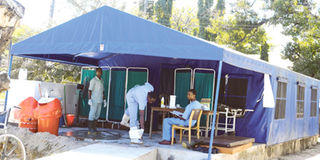UN warns about worrying trend of cholera in Tanzania

What you need to know:
Latest figures show that 54 people have already died from Cholera countrywide, with more than 3,500 others being suspected or confirmed with the preventable waterborne disease.
Dar es Salaam. The cholera outbreak that has wreaked havoc in Dar es Salaam and other regions across the country for about two months now, seems to be spiralling out of control, experts have warned.
Latest figures show that 54 people have already died from Cholera countrywide, with more than 3,500 others being suspected or confirmed with the preventable waterborne disease.
However, the measures being taken to try and bring the outbreak to a halt, are being overpowered by the rate of new infections, a United Nations report suggested yesterday.
In Dar es Salaam alone, UN says, 2,668 cases of patients with excessive diarrhoea have now been registered, and 33 deaths have occurred due to cholera but the disease is now reported to have spread fast to 11 other regions.
A National Task Force comprising of the regional and municipal authorities and the ministry of Health is holding weekly meetings in response to the epidemic to try and co-ordinate a countrywide response to the outbreak.
“Despite these efforts, cholera transmission continues, particularly in Dar es Salaam. The intensity of cholera control interventions specifically through social mobilization and the water and sanitation hygiene, is suboptimal especially in the Dar es Salaam,” noted UN.
Through an epidemiological analysis revealed yesterday, UN noted that in Dar es Salaam, where the disease was first reported, there are weak infrastructural services, such that it was still an uphill task for the authorities to control the outbreak in the near future under such circumstances.
“This is in contrast to other affected regions where regional and council emergency structures are quickly mobilized to respond once an outbreak is declared and containment is rapidly achieved,’’ said the UN report titled: Proposal to support the cholera outbreak response in Tanzania.
The ministry of Health and Social Welfare spokesman, Mr Nsachris Mwamwaja, told The Citizen that it would still prove difficult to contain the outbreak if the communities were not well informed on the basic control measures.
“The spread of Cholera is two-way—there are authorities on one side, and the public as well as the environment on the other side,” said Mr Mwamwaja adding, “If the public remains ignorant and the sewage, water and sanitation remains as it is [poor] now, we are likely not to end the outbreak anytime soon.”
According to UN, the water and sanitation infrastructure in the affected communities in Dar es Salaam is very weak. “There are many illegal connections to Dawasco network. These are unprofessionally installed and they have leakages,’’ reads the report in part.
This, according to the UN, presents an opportunity for more city residents to eat food containing germs including Vibrio Cholera.
“Assuring adequate safe water to effectively control the outbreak therefore remains a major challenge,” said the UN.




